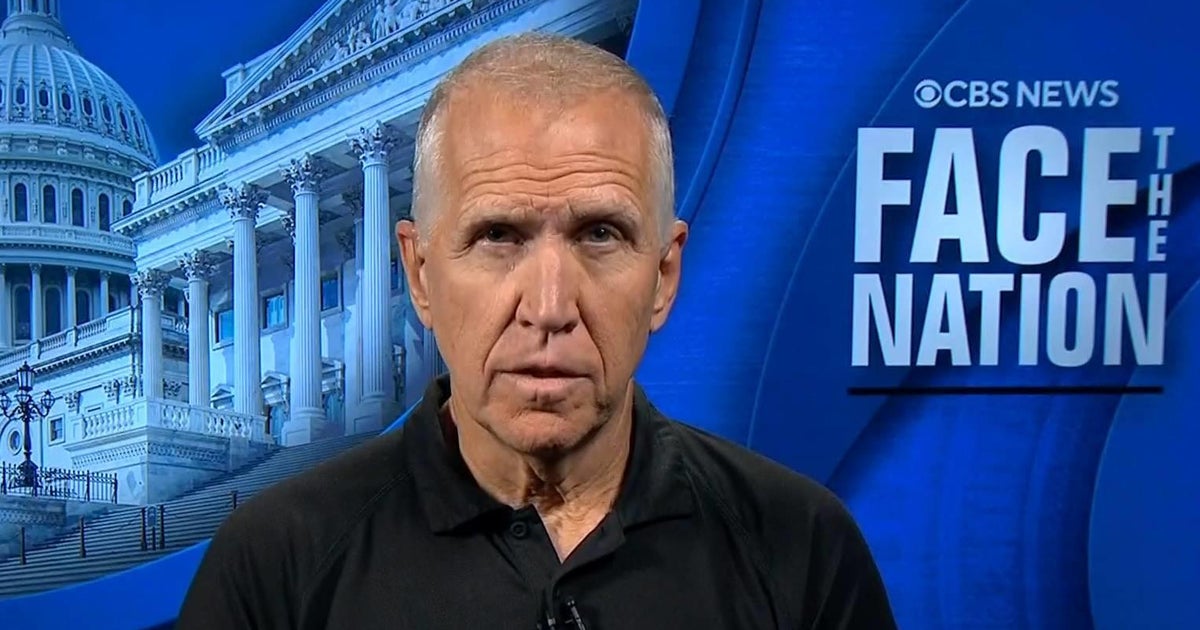CBS News
Consolidating debt with home equity: Pros and cons to consider

Getty Images/iStockphoto
There’s no question that credit card debt is expensive right now. Not only do credit cards typically come with high interest rates, but the recent Federal Reserve rate hikes have resulted in card rates climbing even higher. So if you’re carrying a balance on your credit cards, chances are that you’re paying a significant amount of interest on the charges.
And if you’re dealing with other types of debt as well, like personal loans or student loans, today’s elevated rate environment can make it costly to pay off what you owe. But the good news is that it doesn’t have to be. There are a few simple options for consolidating your debts, which could save you a lot of money in interest charges over time.
For example, if you’re a homeowner with equity in your home, you have the option of consolidating your debts into a home equity loan or a home equity line of credit (HELOC). And, doing so could provide some relief. However, as with any big financial move, there are a few important pros and cons to weigh before taking this route.
Compare today’s top home equity loan options online now.
Consolidating debt with home equity: Pros and cons to consider
Here are some key factors to think about when deciding if a home equity loan is the right debt consolidation strategy.
Pros of consolidating debt with home equity
Let’s start with the potential benefits:
Lower interest rates
The key advantage of using a home equity loan or HELOC to consolidate your debt is that home equity loans and HELOCs tend to have much lower interest rates than credit cards or personal loans. For example, right now, the average rate on a home equity loan is 8.59% (as of April 9, 2024) and the average HELOC rate is 9.04%.
Both rates are substantially lower than the average credit card rate, which is hovering near 22% currently. So, by rolling your high-interest credit card debt into a lower-rate home equity loan or HELOC, you may be able to benefit from significant interest savings over the life of the loan.
Find the best home equity loan rates available to you now.
Simplified payments
A major benefit of debt consolidation is streamlining your payments. Rather than juggling multiple monthly payments to different creditors, by using your home’s equity to consolidate your credit card debt, you’ll have just one consolidated payment to make each month. This can make it a lot easier to budget and stay on top of your debt.
Flexibility with repayment terms
Home equity loans come with more flexible repayment options compared to many other types of debt. When you choose this option, you can typically choose a loan term length that fits your budget and goals, whether that’s five years, 10 years or even longer. This allows you to find a payment schedule that works best for your financial situation.
For example, if you’re aiming to pay off the debt in a shorter timeframe, you could select a 5-year repayment term. This will result in higher monthly payments, but you’ll be debt-free sooner. Alternatively, if you want to keep your monthly costs lower, a 10- or 15-year loan term may be more suitable, though you’ll be in debt for a longer period.
This flexibility can be especially helpful if your financial situation is likely to change in the coming years, as you can adjust the repayment period accordingly. Just keep in mind that the longer the term, the more you’ll pay in total interest over the life of the loan.
Potential credit score improvement
Consolidating multiple debts into a single home equity loan could help improve your credit score over time. By simplifying your payments and reducing your overall credit utilization, which is the amount of available credit you’re using, you may see a positive impact on your credit profile. That’s because credit scoring models look favorably upon consumers who have paid down debt and are utilizing less of their available credit.
And, having a home equity loan on your credit report can be seen as more favorable than having several maxed-out credit cards. Lenders also view home equity loans as a more responsible form of debt, which can further boost your score. Just be sure to make your payments on time each month to get the full benefit.
Cons of consolidating debt with home equity
Now, let’s look at some of the potential downsides:
Risk of foreclosure
Perhaps the biggest risk of consolidating your debt with a home equity loan or HELOC is that by using your home as collateral, you’re putting your home at risk if you can’t afford the payments on your home equity loan. If you are unable to make your loan payments, it could potentially lead to foreclosure, which would be disastrous. This makes it crucial to carefully assess your ability to make the new, consolidated payment each month.
Longer repayment period
Home equity loans typically have longer repayment terms than credit cards or personal loans. While this can make the monthly payments more manageable and offer some flexibility in terms of your repayment schedule, it also means you’ll be in debt for a longer period of time.
Closing costs
Taking out a home equity loan or HELOC will come with closing costs, which can add up to hundreds or even thousands of dollars, depending on the lender fees, the amount you borrow and other factors. These upfront costs should be factored into your analysis, as the added expense could negate the potential interest savings in certain situations.
Reduced home equity
Every dollar you borrow against your home’s equity is a dollar that’s no longer available to tap into if you need it. This can impact your ability to borrow against your home’s equity in the future if you want to access funding for a small business you’re starting, pay for home renovations and repairs or cover another large expense.
Temptation to overspend
When you consolidate your debts into a single, lower-interest loan, it can be tempting to start racking up new credit card balances again. It’s crucial to break the cycle of overspending and stay disciplined with your new payment plan. Otherwise, you’ll be paying for both your new credit card debt and your consolidated debt each month, which could make it difficult financially.
The bottom line
Consolidating debt with a home equity loan is a major financial decision that requires careful thought and planning. But if done responsibly, it can be an effective way to simplify your payments, reduce interest costs and work toward becoming debt-free. As with any major financial decision, though, it’s important to weigh all of your options to determine the best course of action.
CBS News
10/6: Face the Nation – CBS News

Watch CBS News
Be the first to know
Get browser notifications for breaking news, live events, and exclusive reporting.
CBS News
Sen. Thom Tillis says “the scope” of Helene damage in North Carolina “is more like Katrina”

As recovery missions and repairs continue in North Carolina more than a week after Hurricane Helene carved a path of devastation through the western part of the state, the state’s Republican Sen. Thom Tillis called for more resources to bolster the relief effort and likened the damage to Hurricane Katrina’s mark on Louisiana in 2005.
“This is unlike anything that we’ve seen in this state,” Tillis told CBS News’ Margaret Brennan on “Face the Nation with Margaret Brennan” on Sunday morning. “We need increased attention. We need to continue to increase the surge of federal resources.”
Hurricane Helene ripped through the Southeast U.S. after making landfall in Florida on Sept. 26 as a powerful Category 4 storm. Helene brought heavy rain and catastrophic flooding to communities across multiple states, including Georgia, South Carolina, Tennessee and Virginia, with North Carolina bearing the brunt of the destruction. Officials previously said hundreds of roads in western North Carolina were washed out and inaccessible after the storm, hampering rescue operations, and several highways were blocked by mudslides.
Tillis said Sunday that most roads in the region likely remained closed due to flooding and debris. Water, electricity and other essential services still have not been fully restored.
“The scope of this storm is more like Katrina,” he said. “It may look like a flood to the outside observer, but again, this is a landmass roughly the size of the state of Massachusetts, with damage distributed throughout. We have to get maximum resources on the ground immediately to finish rescue operations.”
Hurricane Katrina left more than 1,000 people dead after it slammed into Louisiana’s Gulf Coast in August 2005, flooding neighborhoods and destroying infrastructure in and around New Orleans as well as in parts of the surrounding region. It was the deadliest hurricane to hit the mainland U.S. in the last 50 years, and the costliest storm on record.
The death toll from Hurricane Helene is at least 229, CBS News has confirmed, with at least 116 of those deaths reported in North Carolina alone. Officials have said they expect the death toll to continue to rise as recovery efforts were ongoing, and a spokesperson for the police department in Asheville told CBS News Friday their officers were “actively working 75 cases of missing persons.”
On Saturday, the U.S. Department of Transportation released $100 million in emergency funds for North Carolina to rebuild the roads and bridges damaged by the hurricane.
“We are providing this initial round of funding so there’s no delay getting roads repaired and reopened, and re-establishing critical routes,” U.S. Transportation Secretary Pete Buttigieg said in a statement. “The Biden-Harris administration will be with North Carolina every step of the way, and today’s emergency funding to help get transportation networks back up and running safely will be followed by additional federal resources.”
President Biden previously announced that the federal government would cover “100%” of costs for debris removal and emergency protective measures in North Carolina for six months.
With North Carolina leaders working with a number of relief agencies to deal with the aftermath of the storm, Tillis urged federal officials to ramp up the resources being funneled into the state’s hardest-hit areas. The senator also addressed a surge in conspiracy theories and misinformation about the Biden Administration’s disaster response, which have been fueled by Republican political figures like former President Donald Trump.
Trump falsely claimed that Mr. Biden and Vice President Kamala Harris, his Democratic opponent in the November presidential election, were diverting funds from Federal Emergency Management Agency that would support the relief effort in North Carolina toward initiatives for immigrants. He also said baselessly that the administration and North Carolina Gov. Roy Cooper, a Democrat, were withholding funds because many communities that were hit hardest are predominantly Republican. Elon Musk has shared false claims about FEMA, too.
“Many of these observations are not even from people on the ground,” Tillis said of those claims. “I believe that we have to stay focused on rescue operations, recovery operations, clearing operations, and we don’t need any of these distractions on the ground. It’s at the expense of the hard-working first responders and people that are just trying to recover their lives.”
CBS News
Face the Nation: Tillis, Tyab, Russel

Watch CBS News
Be the first to know
Get browser notifications for breaking news, live events, and exclusive reporting.


